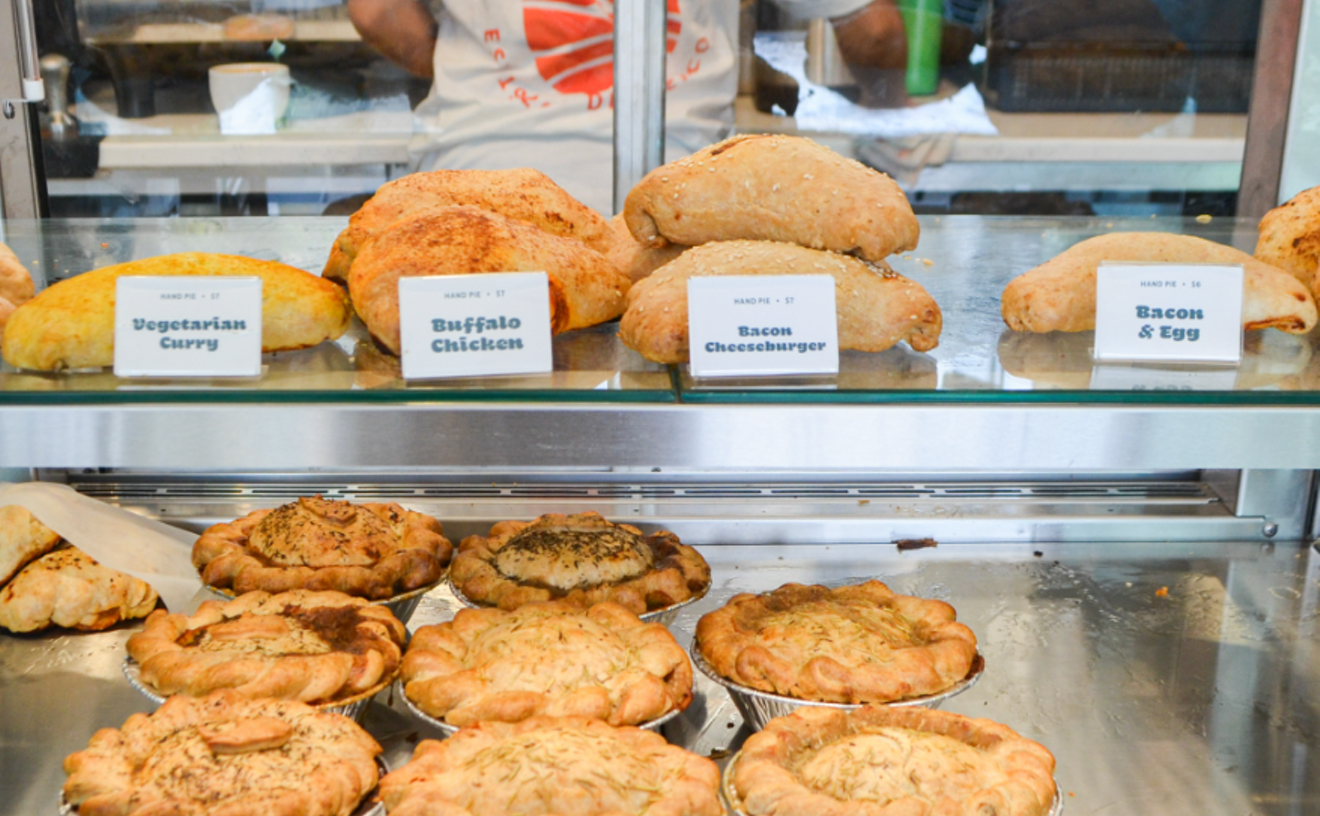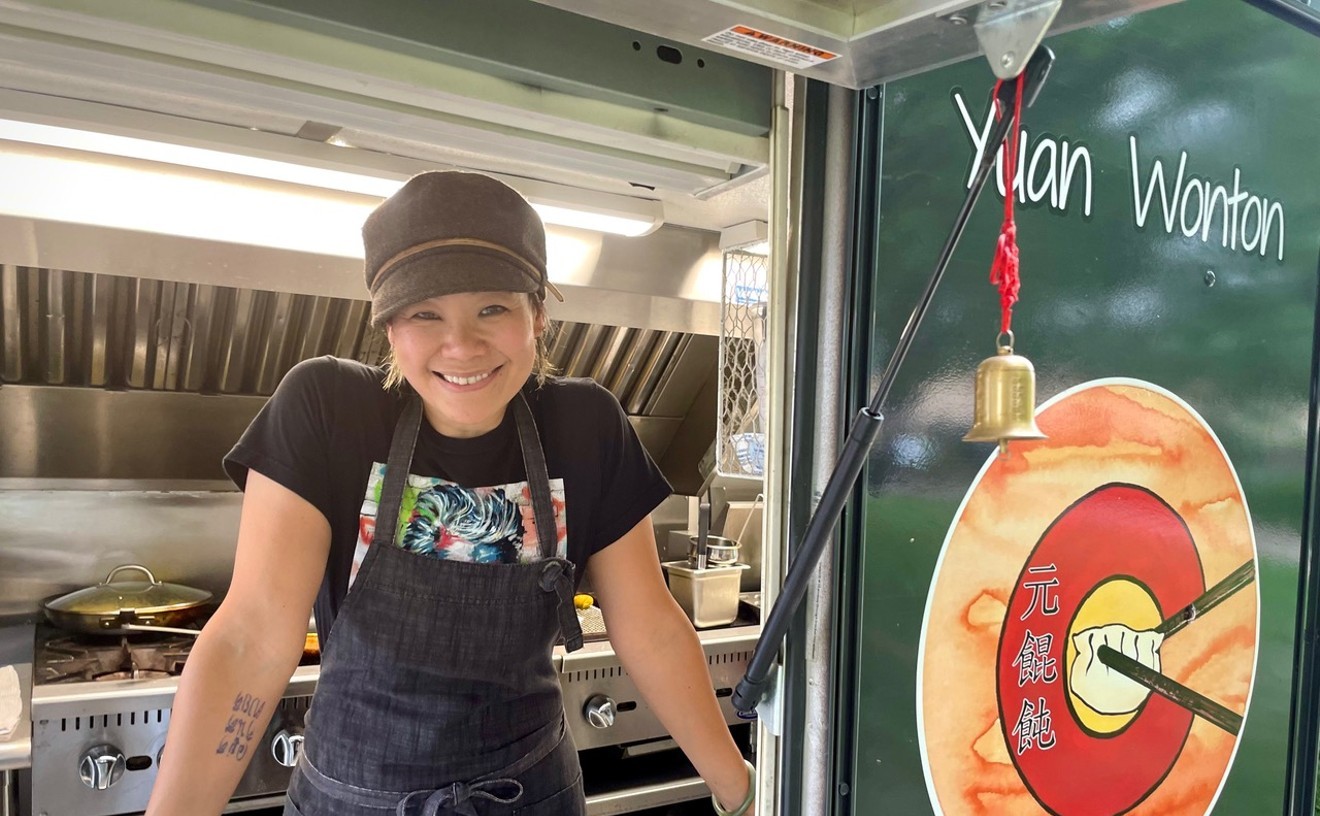Steve Scott Babettes 3350 Brighton Boulevard 303-993-8602 cbabettes.wix.com/babettes
This is part one of my interview with Steve Scott, owner of Babettes at the Source; part two of our conversation will run tomorrow.
Somewhere, the American queen of French cooking is smiling. And Steve Scott, the owner/baker of Babettes, which opened last year in the Source, still remembers the profound influence that Julia Child, the woman who made French cooking accessible to those who didn't know the difference between a beignet and a bisque, had on his life. "When I was growing up, I saw this Dan Aykroyd skit on Saturday Night Live, where he drinks white wine and cuts his finger off -- Julia Child-style -- and when I found out that Julia actually had her own cooking series, I started watching it, and the first time I saw her doing beef Bourguignon, I knew that I had to make it," says Scott, who was born and raised in Santa Rosa, California. "That dish was the very first thing I ever cooked, and I followed every step exactly, and I have to say, it turned out amazing; it was perfect."
See also: First look: Babette's Artisan Breads rises at the Source
And then, says Scott, "I forgot about food until I was in my mid-twenties, mostly because I started professionally racing bicycles instead." But his obsession with cooking soon emerged again, leading him to a job at a small organic grocery store. Scott, who started off in the kitchen there, soon made his way to the bakery -- a transition, he remembers, that "opened up an entirely different world for me, one that I enjoyed a lot more than cooking." Cooking "was throwing things in a pan, whereas baking was more exact, and there were proven techniques that you had to adhere to, which I loved," he says.
Scott then took his baking infatuation to another level, enrolling in Tante Marie's Cooking School in San Francisco, and it was during his time there that he became firmly entrenched in bread dough. "I was looking through a Smithsonian magazine and found an article about Poilâne, in Paris, and there was a picture of this guy -- a baker standing in front a giant brick oven who looked like hell -- and that sealed the deal for me," says Scott. "He had that look of passion -- that look of never compromising -- on his face that only years in the business puts on you, and that's when I decided specifically to become a bread baker." Even now, reflects Scott, "when things get hard and my feet are scuffing on the floor, I still think about that guy."
After solidifying his fate, he landed at Della Fattoria, a commercial bakery on a farm in Petaluma, California, where he baked bread for fifteen hours a day. And then, for family reasons, he moved to Pensacola, Florida, a jaunt that left him jaded. "I worked in some fucked-up, shitty bakeries -- places where people weren't doing stuff right -- so in my spare time, I started baking the breads that would eventually lead me to what I'm doing now," says Scott, who spent a long two years in Florida before heading to Boulder for an opportunity to become the head baker at Breadworks. "Florida was awful, but sometimes you have to eat shit before you know what caviar tastes like."
He rolled dough at Breadworks for nearly three years, departing to take a job as pastry chef at the University of Colorado, where he doled out hundreds of dozens of cookies, muffins and cakes on a daily basis. "I took the job for the money and the benefits, but I liked the fact that it forced me to think about things differently, especially what baking powder, baking soda and altitude can do to the baking process...and how not to wind up with a flat cake," says Scott.
After four years of intense volume and production at CU, Scott was hired as the bread production supervisor for Udi's Artisan Bakery in Louisville. "That bakery is the equivalent of a finishing school for bakers, and it was a great opportunity," explains Scott, who also headed up the wholesale bread department at the Mediterranean, increasing the Boulder restaurant's accounts from three to 25 in four months.
And he might still be there were it not for a call from Andra Zeppelin, editor of Eater Denver and wife of Source developer Kyle Zeppelin. "Andra had tasted my bread, and in the fall of 2012, she reached out and encouraged me to take a look at the space and open a bakery," he recalls. It didn't take much coaxing on the part of the Zeppelins to convince Scott to commit. "The bakery is all mine, I make all the decisions, I'm not making anyone else's formulas, and there's no compromise in quality. Our breads are 100 percent artisan, handmade products made by me, and I'm baking breads that I truly want to make," says Scott, who in the following interview responds to critics who describe his bread as "burnt," admits that he'd like to sell bread to Anthony Bourdain, and insists that Alex Figura, chef of Lower 48, could very well be the best chef in the United States.
Lori Midson: What's your earliest food memory? Steve Scott: Julia Child's beef Bourguignon. As a child, I spent many hours watching PBS, and when I was about ten, I was so intrigued by Julia's beef Bourguignon that I asked my mom to buy all of the ingredients. I followed Julia's instructions exactly, and that's when I had my first truly enjoyable meal.
Ten words to describe you: Intense, passionate, driven, uncompromising, dedicated, married, silly, exhausted, opinionated and passionately angry. You have to be angry to do this at a high level; you have to have the raw emotions. You're working with three simple ingredients, so you can't fucking hide behind anything.
Five words to describe your breads: Complicated, well-hydrated, well-fermented, handmade and transparent.
What are your ingredient obsessions? Whole wheat is super-important to me. It has to be grown by a farmer who is actually concerned with sustainable practices. It has to be stone-milled, manufactured properly, aged appropriately and delivered in a sustainable manner.
Favorite piece of kitchen equipment: My hands. I can touch the flour, mix the dough, react to fermentation as it's progressing and judge when the mix is ready to be divided and mixed.
Favorite smell in the kitchen: Fermented flour. The flavor of well-fermented grain is sweet, creamy and earthy, and can only truly be enjoyed through the natural leavening process of long fermentation with minimal mechanical mixing.
Favorite ingredients to work with: I'm really excited about a whole-wheat flour that we have on order via King Arthur. It's grown in Quebec and milled in North Carolina and creates a notable difference in the fermentation and flavor of the end product. We'll be highlighting this flour in our ferme loaf, which is a mix of spelt and whole-wheat flours that creates a rustic loaf with a touch of sweetness from the spelt.
One ingredient that you won't touch: Bromated flour, a chemical process that uses bleach to bleach out natural pigments present in the grain to appeal to a broader audience, and, in the process, leaves trace amounts of bleach in the saleable product. It's usually made from synthetic wheat. I also won't touch gluten-free products. That stuff is poisoning our society. And we couldn't do gluten-free bread even if we wanted to, because there's wheat everywhere in the bakery.
One ingredient in baking that's way overused: Baking soda or baking powder. So many of the pastries we make at Babettes are leavened with eggs, so we don't have a need for baking soda or powder to make a great-tasting product.
Food trend you'd like to see in 2014: Well-trained bakers. There's a myth that because you love to bake, you have passion, which isn't always the case. I found my passion for baking through a photo in a magazine of a tired baker in a Paris basement, and I haven't looked back since. The power of an image or thought can turn a like into a passion, and that, in turn, will make a great baker. Thinking you can do this in a couple of years will get you into trouble; being a baker is a lifestyle that chooses the person and molds you over the course of years of dedication, hard work and study.
Food trend you'd like to see disappear in 2014: The myth that white flour is poison. The white flour you get on the shelf is garbage. The white flour we use at Babettes, however, is high-extraction flour, meaning that a portion of the germ and bran are not sifted off at the mill, and it's not as white as you'll buy at the grocery store. Our wheat is also non-GMO and not synthetic, which is all you're going to get in the bread aisle at the grocery store. Babettes uses whole grains that are sustainably grown and milled to our specs on stone rollers. The grain won't heat up and the nutrients won't leach out. White flour produced this way is not poison.
There are all sorts of romantic notions about what it's like to bake bread. What's it really like? If you think that baking bread is as romantic as the shiny books make it out to be, then this is the wrong field for you. Baking bread takes a substantial amount of hard work, dedication and passion.
Some people have described your bread as "burnt." How do you respond to that? I'm doing bread the way it was done 200, 300 years ago. Over time, people wanted whiter bread, but white bread lacks flavor, so through fermentation, extreme hydration, proper handling and a full bake, we're able to produce loaves that have great crusts, nice, moist interiors and good keeping qualities. Our bread is not burnt; it's well caramelized because of the sugars that are naturally present in the wheat, which helps with fermentation and caramelization during the baking process -- and it creates flavor.
What's the best part of being in the bakery business? The ability to learn and evolve every day and to pass on what I know through mentoring other passionate bakers.
How have your breads evolved over the years? My breads have become more fermented and more hands-on, and I have pushed the limits of increased hydration.
Best bakeries in Denver/Boulder other than your own: They're all great, especially the breads that Udi's bakes for the farmers' markets. That bread, specific to the farmers' market, is incredible. I also like the bakery at the Med in Boulder, specifically when David Kaminer is baking. He cares deeply about what he does. And Grateful Bread bakes a great ciabatta. We can certainly appreciate that there is room for everyone to satisfy the varying tastes of Denver, be it the customer that likes our beloved dark crust or those who prefer a lighter bake.
What are the most challenging aspects of being a baker? Finding staff that's as passionate and dedicated as myself to the day-in-and-day-out process of baking that needs to be fostered without interruption.
When you look at the food scene here in Denver, what impresses you? What disappoints you? There seems to be a diversity of food, but a lack of personal expression, the kind that's evident at Alex Figura's new restaurant, Lower 48. I am thoroughly impressed by Alex; he's a bright young chef who's not afraid to take chances or bring new combinations of food to the Denver scene. In fact, I really believe that Alex is the best chef in Denver, if not the United States. He's on par with Thomas Keller, he's doing everything from a pure place, and he's making the most well-balanced, creative food that I've had in a really, really long time.
Follow @CafeWestword










